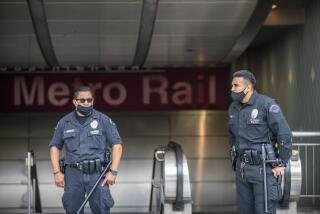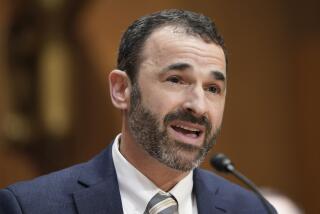FBI to Shift Agents to Terror War
WASHINGTON — The FBI, under fire for its failure to link possible terrorist threats in the weeks before Sept. 11, is planning to redeploy more than 500 additional agents to counterterrorism activities and to consolidate those operations in Washington, officials said Tuesday.
The reorganization plan, expected to be announced today by Atty. Gen. John Ashcroft and FBI Director Robert S. Mueller III, seeks to avoid the breakdowns in coordination that plagued FBI terrorism investigations in Phoenix and Minneapolis last summer.
Mueller’s plan would create a new layer of supervisors, analysts and “flying squads” in Washington responsible for overseeing and more aggressively pursuing terrorism leads and trends around the world, according to officials familiar with the plan.
It would also move the FBI further from its traditional responsibilities of fighting narcotics, white-collar crime and violent crime by reassigning 518 agents in those areas to counterterrorism operations, officials said.
In all, the plan put together by Mueller and senior aides over the last few months would increase by about 70% the number of federal, state and local law enforcement agents detailed to the FBI’s fight against terrorism, officials said.
But even before the plan is officially announced, some congressional critics are complaining that it doesn’t go far enough.
“Making technology and intelligence analysis priorities are no-brainers, but a new organization chart alone won’t work,” Sen. Charles E. Grassley (R-Iowa) said Tuesday.
Officials inside and out of the FBI have been awaiting Mueller’s reorganization plan for weeks, and their anticipation has only been intensified by the recent barrage of questions about whether FBI supervisors in Washington ignored terrorist suspicions of agents in Phoenix and Minneapolis before Sept. 11.
In a blistering letter sent to Mueller last week, Coleen Rowley, general counsel in the bureau’s Minneapolis office, accused officials at headquarters of putting up roadblocks in August that prevented field agents from pursuing evidence that flight school student Zacarias Moussaoui was part of a broader terrorist plot. Moussaoui, now suspected of being the intended 20th hijacker, is the only person charged with any crime in connection with the Sept. 11 attacks.
FBI officials already have a significant amount of centralized power to oversee terrorism investigations in field offices. In her letter, Rowley said plans to consolidate those operations in Washington further would “simply fly in the face of an honest appraisal of the FBI’s pre-September 11th failures.”
Rowley said field offices in Minneapolis and, separately, in Phoenix, where an agent warned last July that Middle Easterners enrolled in flight schools could be planning an attack, performed admirably in picking up on threats before Sept. 11. “The same cannot be said for the FBI Headquarters’ bureaucracy and you want to expand that?!” she wrote.
Mueller’s plan to create an Office of Intelligence to track terrorist leads would rely on about 50 CIA officials to help beef up the bureau’s operation. It would also commit more resources to technology, including an overhaul of the FBI’s computer system, and would seek to train more agents in Arabic and Farsi, officials said.
“Certainly the outlook is to have everything concentrated in Washington,” said an FBI official who asked not to be identified. “That doesn’t mean the field offices, specifically New York, won’t have a significant role. They certainly will.”
Historically, the Manhattan FBI and U.S. attorney’s offices have been the national hub for terrorism investigations. Their teams of specialists played central roles in investigating the 1993 World Trade Center bombing and other high-profile cases.
Ashcroft has already undercut New York’s influence by shifting responsibility for the Sept. 11 prosecutions to federal authorities in Washington and northern Virginia, and Mueller’s plan would further erode New York’s preeminence, threatening to exacerbate tensions, officials said.
A Justice Department official who asked not to be identified said Ashcroft, who oversees the FBI, believes it is important to centralize counterterrorism operations in Washington, despite the growing questions about how headquarters handled pre-Sept. 11 leads.
Currently, agents around the country “are collecting the intelligence out in the field, but it’s never being looked at [in Washington] comprehensively. If you’re collecting this stuff in Phoenix, it’s not being put together with the stuff in Minnesota unless there’s some known connection,” the official said.
“The structure isn’t there. [Mueller’s plan] brings in expert analysts who can better analyze that information and look at it in a more comprehensive way,” the official added.
That effort would rely in part on what the FBI calls “flying squads” of counterterrorism experts based in Washington. Mueller “views them as being able to fly out to areas that are doing important counterterrorism work and help them, and bring the knowledge back to headquarters to supplement these cases,” according to a congressional official familiar with the closed-door briefings that the FBI has given members of Congress in recent days.
Ronald Kessler, the author of “The Bureau: The Secret History of the FBI,” said he thinks the move is a positive step.
The planned consolidation “will make a lot of difference.... Less is going to fall between the cracks. Before Sept. 11, they were inundated with leads that were just not being followed,” said Kessler, who blames many of the FBI’s problems on the failure to upgrade computer systems under former Director Louis J. Freeh.
In the weeks after the attacks on the World Trade Center and the Pentagon, the FBI deployed about 6,000 of its 11,000 agents to counterterrorism investigations in an effort to reconstruct the events of Sept. 11 and prevent future attacks.
That number has dwindled substantially in the last 8 1/2 months, although officials would not say exactly how many agents are now assigned to counterterrorism operations.
Mueller’s plan would create a permanent counterterrorism work force of at least 3,718 federal, state and local law enforcement agents, an increase of about 70% from the 2,178 people working on counterterrorism before Sept. 11, officials said.
Some members of Congress are likely to push for an even greater deployment.
“The FBI is the lead agency for counterterrorism, and less than a quarter of its agents, from what we’ve been told, are going to be doing counterterrorism,” said a congressional aide who asked not to be identified. “We don’t think it goes far enough.”
More to Read
Sign up for Essential California
The most important California stories and recommendations in your inbox every morning.
You may occasionally receive promotional content from the Los Angeles Times.










